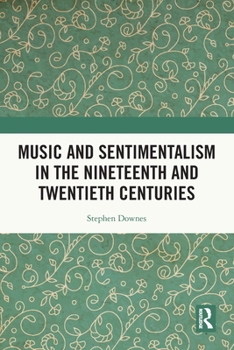Music and Sentimentalism in the Nineteenth and Twentieth Centuries
Select Format
Select Condition 
Book Overview
In a wide-ranging study of sentimentalism's significance for styles, practices and meanings of music in the nineteenth and twentieth centuries, a series of interpretations scrutinizes musical expressions of sympathetic responses to suffering and the longing to belong. The book challenges hierarchies of artistic value and the associated denigration of sentimental feeling in gendered discourses. Fresh insights are thereby developed into sentimentalism's place in musical constructions of emotion, taste, genre, gender, desire, and authenticity.
The contexts encompass diverse musical communities, performing spaces, and listening practices, including the nineteenth-century salon and concert hall, the cinema, the intimate stage persona of the singer-songwriter, and the homely ambiguities of 'easy' listening. Interdisciplinary insights inform discussions of musical form, affect, appropriation, nationalisms, psychologies, eco-sentimentalism, humanitarianism, consumerism, and subject positions, with a particular emphasis on masculine sentimentalities.
Music is drawn from violin repertory associated with Joseph Joachim, the piano music of Chopin, Schumann, and Liszt, sentimental waltzes from Schubert to Ravel, concert music by Bart k, Szymanowski and G recki, the Merchant-Ivory adaptation of The Remains of the Day, Ant nio Carlos Jobim's bossa nova, and songs by Duke Ellington, Burt Bacharach, Carole King, Barry Manilow and Jimmy Webb.
The book will attract readers interested in both the role of music in the history of emotion and the persistence and diversity of sentimental arts after their flowering in the eighteenth-century age of sensibility.





